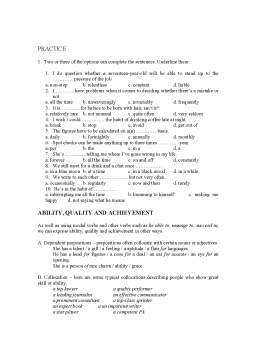Extras din curs
FREQUENCY
As well as using modal verbs, we can express frequency in many ways.
A. Adverbs and adverbial phrases.
1. we most commonly express the idea of “how often” with adverbs of frequency:
I rarely / seldom go into the centre of town if I can help it.
John regularly / normally often smokes more than a packet a day.
We were constantly / regularly being criticised.
I’ve told you repeatedly not to sleep in the classroom.
2. we can also use adverbial phrases – usually in different positions in the sentence:
I still see my first girlfriend now and then / now and again / every so often.
We were attacked all the time / again and again.
It’s been raining on and on all day.
From time to time I check my e-mails.
I’ve been working non-stop since Friday.
3. we can express frequency more precisely in many ways:
This happens every four years / twice a month / on daily basis forty times a minute.
Buses leave every hour on the hour.
I cook once in a blue moon.
B. Adjectives – we can often express frequency using adjectives:
It’s uncommon / unusual / rare for anyone to disown his parents.
Some people are prone to headaches.
We are all susceptible to flattery.
I’m liable to get sunburnt.
He won how much? That’s unheard-of!
C. Habits and trends – verbs, and verb and noun phrases, can express habits and trends:
Many people tend to talk too much.
Some are in the habit of talking to themselves.
Others have a tendency not to listen to other people.
Do you follow the latest trends in fashion?
Parisian designers set the trend for others to follow.
PRACTICE
1. Two or three of the options can complete the sentences. Underline them:
1. I do question whether a seventeen-year-old will be able to stand up to the ………… pressure of the job.
a. non-stop b. relentless c. constant d. liable
2. I ……….. have problems when it comes to deciding whether there’s a mistake or not.
a. all the time b. unwaveringly c. invariably d. frequently
3. It is ……….. for babies to be born with hair, isn’t it?
a. relatively rare b. not unusual c. quite often d. very seldom
4. I wish I could ………….. the habit of drinking coffee late at night.
a. break b. stop c. avoid d. get out of
5. The figures have to be calculated on a(n) ………… basis.
a. daily b. fortnightly c. annually d. monthly
6. Spot checks can be made anything up to three times ………… year.
a. per b. the c. in a d. a
7. She’s ………… telling me where I’ve gone wrong in my life.
a. forever b. all the time c. on and off d. constantly
8. We still meet for a drink and a chat once …………….
a. in a blue moon b. at a time c. in a black mood d. in a while
9. We write to each other …………….. but not very often.
a. occasionally b. regularly c. now and then d. rarely
10. He’s in the habit of …….........
a. interrupting me all the time b. humming to himself c. making me happy d. not saying what he means
ABILITY, QUALITY AND ACHIEVEMENT
As well as using modal verbs and other verbs such as be able to, manage to, succeed in, we can express ability, quality and achievement in other ways.
A. Dependent prepositions – prepositions often collocate with certain nouns or adjectives.
She has a talent / a gift / a feeling / a aptitude / a flair for languages.
He has a head for figures / a nose for a deal / an ear for accents / an eye for an opening.
She is a person of rare charm / ability / grace.
Preview document
Conținut arhivă zip
- Lesson 4 - Curs Engleza.doc

















